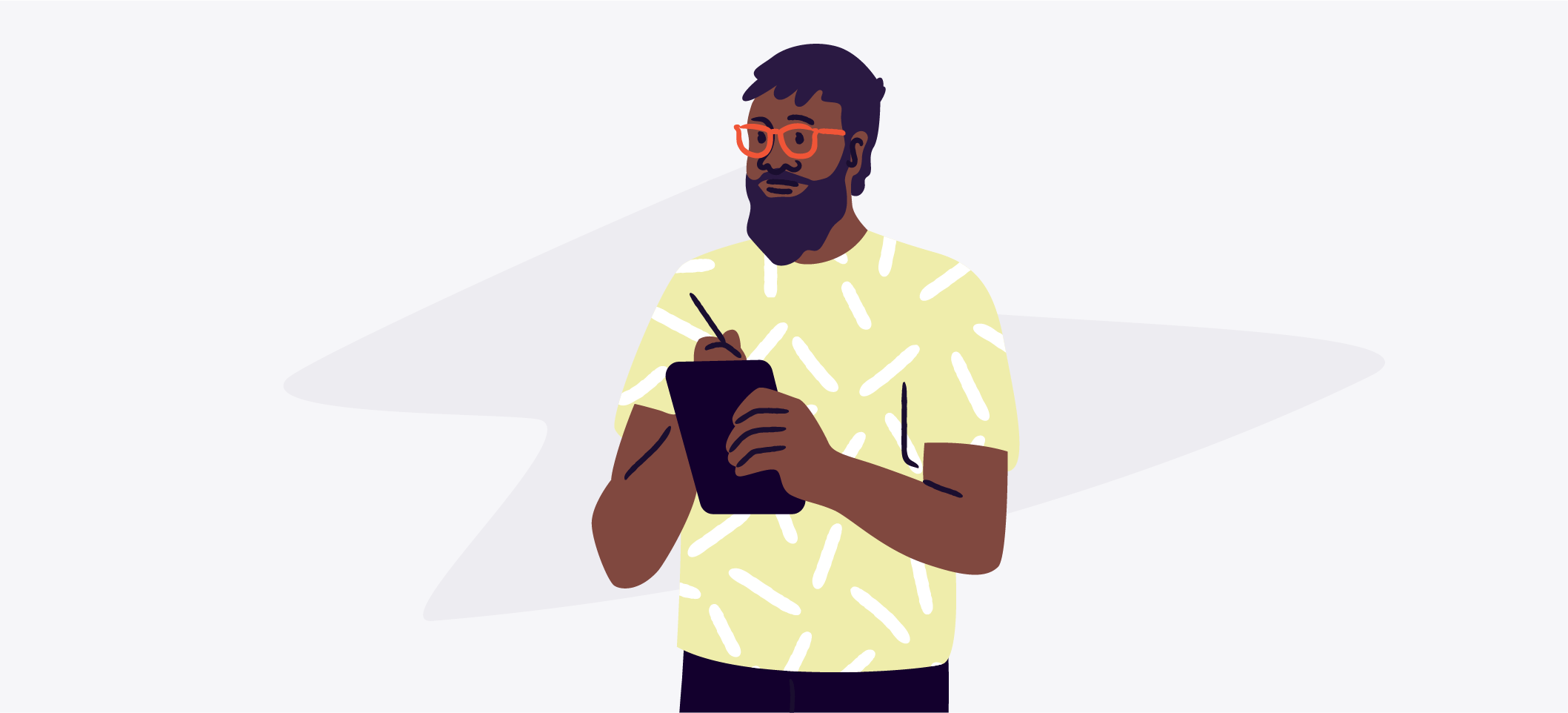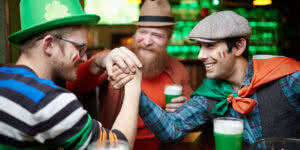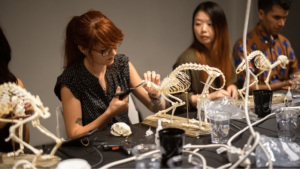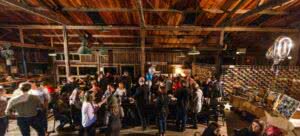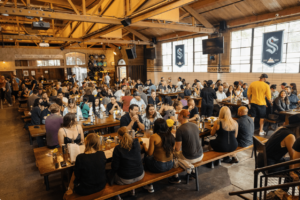Bricks-and-mortar retailers have a key advantage over point-and-click shopping – there’s an actual space to bring people together with your store’s products. As a retailer, having in-store retail events broadens your access to potential customers and generates interest in your brands.
Creating in-store events is a great way to both bring your customer base together and grow your community. The event can effectively reinforce relationships between you and your customers, reminding people why they already love your products and providing an opportunity to introduce them to your latest offerings. All you really need are some fun retail event ideas.
To help you to create innovative retail events, we’ve put together this guide so you can take full advantage of the space you have available.
Table of contents
What to consider when planning an in-store event
Retail event ideas to get you started
What is a retail event?
A retail event is typically open to the public, organised or hosted by a retail store – often at the store’s location. If the occasion calls for it, events can be held elsewhere.
An in-store retail event will generally feature products sold by the retailer – for example, a store that sells kitchen equipment may host a cooking class using its wares, or an outdoor equipment store might organise a wilderness survival class featuring its gear.
Benefits of retail events
While retail events can require a time commitment and a budget, they help brands stand out from other online and bricks-and-mortar competitors. This has important marketing and branding benefits. An in-store event establishes the brand as more than a simple retailer, introducing a lifestyle element that can lead to increased growth and opportunities.
In addition to distinguishing a store’s brand, events in retail settings also help with:
Building your customer base
Events introduce your store to new customers. Event-goers often bring friends or family, who may not be familiar with either the activity or the brand. Similarly, people looking for an event to attend may find a brand they wouldn’t have found normally. Events can thereby broaden a brand’s marketing reach.
Brand loyalty
Retail events strengthen the association and connections event-goers have between a retailer’s products and the activity at the centre of an event. That association will often increase the event-goer’s brand loyalty and expand the brand’s reach due to the event activity. For example, an athleticwear brand might attract brand loyalty among the event-goers at their in-store yoga class, or a video-game retailer could increase its association with gaming by hosting an e-tournament.
Increased sales and revenue
A more extensive customer base and greater brand loyalty naturally lead to increased sales and revenue. You can then maintain that growth by continuing an events program that keeps widening your brand’s reach.
What to consider when planning an in-store event
When brainstorming ideas for in-store events, a good first step is to take a broad overview of your store, your community, and your goals. This helps you create a solid foundation on which to build your event and enhances your chances of success.
1. Know your community and audience
It’s a golden rule: know your audience. After all, if you don’t know who your audience is, how will you know how to interest and inspire them? And in your case, your audience will likely be made up of your customer base. So be sure to notice who your customers are. Are they older or younger? Married or single? Students or professionals? The types of events that appeal to university students, for example, will be different to those that appeal to families.
2. Connect with your brand
As interesting and entertaining as your event may be, remember that the purpose of hosting an event is to grow your brand by growing your community. This means it’s essential to take full advantage of every branding opportunity you can. For example, promote the event as being “presented” by your brand, so your community immediately associates your brand with the event.
3. Get noticed
Make your event stand out. Instead of a book reading of the newest murder mystery at your independent bookshop, turn it into a murder mystery event and have guests figure out who the “murderer” is. Take the unique aspects of your store and highlight them throughout your event. If you run a fashion boutique, a fashion show complete with a catwalk could grab attention. Get creative!
4. Schedule strategically
Dates around holidays are ideal times to schedule your retail events. People are already in a festive mood, they’re willing to go out to events, and they can often be in the market to purchase gifts as well. More shoppers mean more foot traffic around your store’s location, so your event can attract passers-by who may not be familiar with your event or shop.
Retail event ideas to get you started
Now that you’ve considered some concepts for your event, it’s time to determine what sort of formats and topics will help with the goals of your retail marketing plan. No matter what idea you decide to go with, be sure to adapt your plan to suit your brand’s identity. That way, your guests will have an engaging experience learning about your products, and you’ll reinforce your branding by making the products integral to the event.
1. Host a fundraiser
Turn your event into a fundraiser and contribute to society while associating your brand with altruistic and noble undertakings. The great thing is, it doesn’t really matter what sort of retail sector you’re in – there’s almost always a charitable angle that you can pursue. For example, if you have a bakery, host a fundraiser for underprivileged kids to do patisserie training.
2. Hold a class or demonstration
People love to learn, especially when it’s about something they’re interested in and want to explore. Retail event ideas that teach a new skill or give attendees new knowledge can be effective, especially if your shop sells products that are used in the class. For example, cooking classes and demonstrations make natural – and popular – events for stores that sell kitchen appliances. Similarly, if you sell electronics goods, host a demonstration that teaches how to best outfit your home theatre or AV setup.
3. Showcase a product
If you have a special product you want to draw attention to, consider hosting a product showcase event that highlights everything you want people to know about it. If it’s your boutique’s new fashion line, hire some models and show off the goods. Make the presentation attention-grabbing with special lighting and music.
4. Bring in a guest speaker
Guest speakers can create excellent events, especially if the guest is noteworthy or accomplished. An author at a bookshop is a classic example, but there’s a host of other possibilities. Invite a jeweller to speak at your jewellery boutique, or invite a popular gaming streamer to your video game store for a signing.
5. Thank your community
Express your gratitude to your returning – and new – customers with a special customer appreciation event. Creating a memorable, positive event can be enough to persuade customers that it’s worth continuing to shop with your business – and you get to spread the word about your products, too.
Build awareness with these promotional event ideas for your retail store
Alongside your event’s overall format, there are opportunities for you to further promote your brand during the event. These can take the form of sales promotions that will familiarise your guests with your latest products, for example.
Since you’re hosting this event, you want to brainstorm as many retail marketing event ideas as possible, so you can take full advantage of your investment in the event.
1. Get trending on social media
Social media can be a great way to get the word out about your event. Offer a promotion to anyone who shares posts about your event and give them a discount in-store. Eventbrite Boost makes it easy to promote your event across a range of social media sites, which can magnify the number of people who learn about your event.
2. Offer freebies
If you have samples, send some out before your event to your most valuable clients. For the event itself, inspire early arrivals by offering a limited number of swag bags stocked with some of your favourite items on a first-come, first-served basis. The more people that know about your product, the better.
3. Run competitions
Another time-tested way to promote your brand is with prize draws and competitions. Have a breakout during your event for a special prize draw, giving away a store item to the lucky winner. Or go for the classic option – a trivia quiz – but make the questions focus on your brand.
Success breeds success
It always helps to know what’s worked in the past and what other event creators in similar situations are doing. Attending a trade show for retailers is one place to find out what others are doing well. It gives you a sense of whether your ideas are on track or if they might be unworkable. Let’s look at what some of our event creators have been up to and take inspiration from their success.
99 Bikes builds trust with their customers
In multiple locations across Australia and New Zealand, bike store 99 Bikes host monthly classes on basic maintenance, free for their club members. Riders learn how to clean and assess their bike for safety, resolve simple mechanical issues, and change a tyre and tube if they end up with a flat. These events build trust between 99 Bikes and their customers, helping club members gain confidence and the skills to independently take care of their bikes. 99 Bikes also runs women-only maintenance classes, as well as e-bike group rides for customers to test out and learn more about electric bikes and scooters.
The Unfit Run Club partners up
For their “Unfit X Fractel Pop-up Store and Headwear Launch Event”, the Unfit Run Club are launching their limited-edition hat range that is made by performance headwear brand, Fractel. For the launch party in an art gallery, they hired a DJ and held a social run. They also teamed up with a winery for the wine, a brewery for the beers, and local coffee and catering.
DRNKS with the winemakers
Event creators DRNKS have hosted in-store wine tastings at their shop, as well as pizza parties and dinners elsewhere, to promote their delicious beverages. For example, at their “In- store tasting w/ Parley Wine + GULA snacks”, attendees got to meet the three winemakers behind the label Parley Wine.
Learn how to brew at The Hop & Grain Brew Stores
The Hop & Grain Brew Stores in Marrickville and Moorebank, Sydney, run classes on basic brewing, where attendees can learn everything they need to know to make their own home-brewed beer. Specifically designed for people who have never brewed before or have only just started, the two-hour event features a demonstration and a Q&A session. To boost its sales, The Hop & Grain Brew Store offers starter kits and refills after the class for attendees.
Beauty advice with the Parla Hair + Face Hub
The Parla Hair + Face Hub hold workshops such as their “Minimal Beauty Master Class” to provide their customers with an evening of learning. With a glass (or two) of bubbles, participants learn their top tips on how they can easily style their hair, brows and skin for a minimal and natural look.
Now turn your retail event ideas into event realities
Once you’ve decided on the best format for your in-store retail events and have secured your guest speakers or event partners, create your event on Eventbrite. Take advantage of the array of marketing and promotional tools, including ticket sales and registration, and Eventbrite Boost, the event promotion tool that makes it easy to market your event across social media platforms and more.
Get your next event started today

